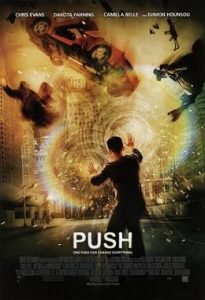
(Sight & Sound, BFI)
Hong Kong, two days from now. For decades, governments round the world have imprisoned and experimented on people with paranormal powers.
The sci-fi/chase thriller Push is intermittently interesting, largely unengaging, but better than its poor advance word suggested. The film’s generic premise – people with paranormal powers are hunted by an evil government agency – is boosted by several good ideas, such as setting the whole story in Hong Kong. Hollywood action franchises from James Bond to The Dark Knight (2008) have long reduced foreign locations (Britain included) to quick visual bites, a tendency taken to extremes in last year’s Jumper. Push’s world feels substantial and lived-in for escapist fare, with plenty of local colour.
The sight of Western actors running around a populous Asian city is reminiscent of Lost in Translation (2003), with the earlier film’s pervasive alienation vibe overlaid on a tale of paranormal expats on the run. (Sci-fi mutants often play the role of outsiders in the crowd.) The film is directed by Scotland’s Paul McGuigan (Gangster No. 1, 2000, Lucky Number Slevin, 2006) and Push’s first act sometimes evokes the work of his compatriot Danny Boyle, with a teeming mise-en-scene and spikily inventive set-pieces – most impressively a chase through a marketplace as screaming telekinetics blow up fish and fishtanks.
Former child actress Dakota Fanning plays a teen prophetess who sketches pictures of impending doom, a device that’s probably too close to the TV show Heroes. The 14-year old Fanning (who’s still able to voice a child heroine in the animated Coraline) is very good, whether getting rebelliously drunk in one of the film’s most amusing scenes, or just conveying a girl who wants to be self-possessed but needs a surrogate big brother (Chris Evans as another runaway). Generous viewers may give the film-makers the benefit of the doubt, and presume that Fanning’s brief outfit is meant to fit her character’s personality, rather than just being a sleazy homage to Natalie Portman in Leon (1994).
The relationship between Fanning and Evans is fine, but there are too many other players jostling for room. Chinese actress Xiao Lu Li has presence as a villainess – she suggests an evil sister-figure for Fanning to balance Evans’ good brother – but the other heavies, led by Djimon Honsou, are ciphers. A suddenly-introduced relationship between Evans and an old paranormal flame, played by Camilla Belle, feels clumsy and makeshift. Later on, it turns into a clever story device as the film brings on Philip K Dick-style ambiguities about memory, but viewers will be losing interest by then.
Oddly, Push’s plot hinges around a memory of a visit to Coney Island, as did last year’s monster film, Cloverfield. The hero’s gambit of wiping his memory to fool the opposition is already becoming a cliché, anticipated in both Heroes and Death Note: The Last Name (2006). It’s Belle’s character who pulls the nastiest memory trick, implanting a fake recollection of a murdered brother in a nameless goon so that he shoots his partner. The villainous Honsou, meanwhile, is shown treating normal mundane people as puppets who can be literally turned on each other.
Push peaks early, its bright ideas scuppered by to-ing and fro-ing and a plot that takes too long to work through. (Even the opening-credits voiceover is overlong, recapping a conspiracy history that’s as dull as it was in last year’s Indiana Jones and the Kingdom of the Crystal Skull.) Maybe the final shoot-out, set in the bamboo scaffolding of a half-built Hong Kong skyscraper, inadvertently suggests a remedy. An okay sequence, it’s inevitably inferior to the mayhem put on screen by the city’s indigenous directors. In the unlikely event of a Push sequel, why not cut out the middle man and use John Woo?
[amazon_link asins=’B00206U5XY,B00206U5XO,B00G3E667I’ template=’ProductCarousel’ store=’anime04c-21′ marketplace=’UK’ link_id=’2ba3d12f-9c6b-11e8-8d0b-5350d73c080e’]
